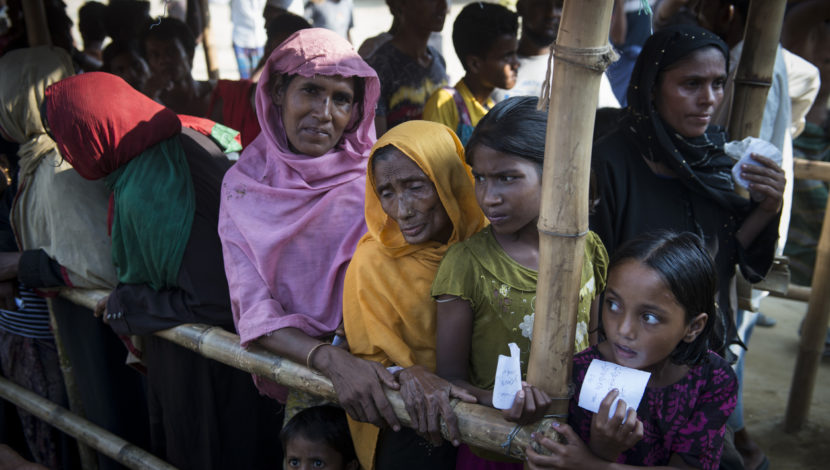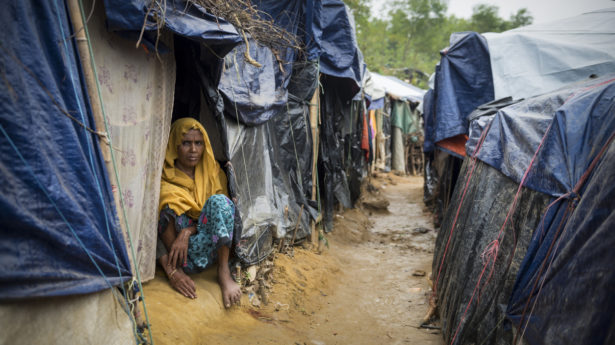The Unitarian Universalist Service Committee advances human rights through grassroots collaborations.
International Day of Nonviolence Calls Us to Honor Rohingya Struggle against Genocide

By on October 1, 2021
October 2 marks the United Nations’ International Day of Nonviolence. Commemorating the birthday of Mohandas Gandhi, the occasion reminds us of both the power and the peril of nonviolence as a strategy for social change. Gandhi developed a method of nonviolent resistance to injustice that brought the world’s then-largest colonial power to its knees. Yet he also paid the ultimate price for it, being gunned down by a right-wing assassin in 1948. On that day, as on so many others since, entrenched privilege responded to nonviolent resistance with more violent suppression.
As October 2 arrives this year, we are reminded of these truths with special urgency. Mohib Ullah, a leading advocate for the human rights of the Rohingya people, was murdered by an assassin’s bullet in a refugee camp in Bangladesh. Mohib Ullah was a constant and courageous advocate for his people’s rights, and his killing is an attack on the entire Rohingya community.
If any event could underline more starkly both the inestimable courage it takes to engage in nonviolent resistance, as well as the martyrdom that often faces those who walk this path, we should not dare imagine it.
The same is true of innumerable other acts of violence that have been committed against the Rohingya people. Their mass-expulsion from the borders of Myanmar in 2017, as part of a larger genocidal campaign, came after decades of racist discrimination and exclusion, which continue to this day. The Burmese military attacked them, and violated the rights of many other ethnic minorities, long before they turned their guns on the entire country’s elected civilian leaders in a bloody coup in February 2021.
It is hard to escape the thought that, if the world had responded more assertively to the Burmese military’s earlier genocide against the Rohingya and its other crimes, the horrible events that have taken place in that country since then might never have happened.
The United States for far too long was among the global powers unwilling to take bolder action to hold the Burmese military to account. While U.S. leaders were well aware of the violence being inflicted on the Rohingya, they muted their response and refused to use the word “genocide” in describing these crimes, out of fear of alienating Burma’s then-civilian government. Whatever the reasoning behind this strategy, it failed. The Burmese military overthrew even what limited and exclusionary “democracy” Burma had, and led a bloody crackdown against the rights of their citizens.
Since that time, Burma’s people have responded with nonviolent resistance in the best Gandhian tradition. A massive civil disobedience movement took off across the country, with ordinary citizens often putting themselves at risk of torture, enforced disappearance, and death to call attention to the abuses of the oppressive military. While Burma’s elected government-in-exile has more recently urged the country’s people to take up arms to resist the ruling junta, the Burmese military retains an overwhelming monopoly on the use of force in its unequal struggle against their own people.
The people in Burma who engage in civil disobedience, the Rohingya leaders of the refugee camps and the diaspora who fight for their rights even in the face of bloodthirsty repression and death threats—they teach us the meaning of courage. They show both the moral power that nonviolent resistance has, as well as the terrible penalty it often exacts.
Those like myself who do not live these experiences cannot know where people find this courage and this strength. But we can do our part to show solidarity in a smaller way. We can call on our own government to take a stronger stance against the suppression of the Rohingya and the crimes of the Burmese military.
In particular, the U.S. government should finally issue a formal acknowledgement that the persecution of the Rohingya meets the international definition of the crime of genocide; and they should back the ongoing efforts of Rohingya leaders and their allies around the world to seek justice for this atrocity through international courts. There is no better way to honor the legacy of people like Mohib Ullah who died fighting for the rights of the Rohingya people and the cause of justice.
***
About UUSC: Guided by the belief that all people have inherent worth and dignity, UUSC advances human rights globally by partnering with affected communities who are confronting injustice, mobilizing to challenge oppressive systems, and inspiring and sustaining spiritually grounded activism for justice. We invite you to join us in this journey toward realizing a better future!
Image Credit: iStock – Joel Carillet

